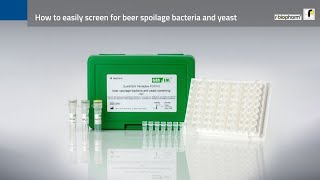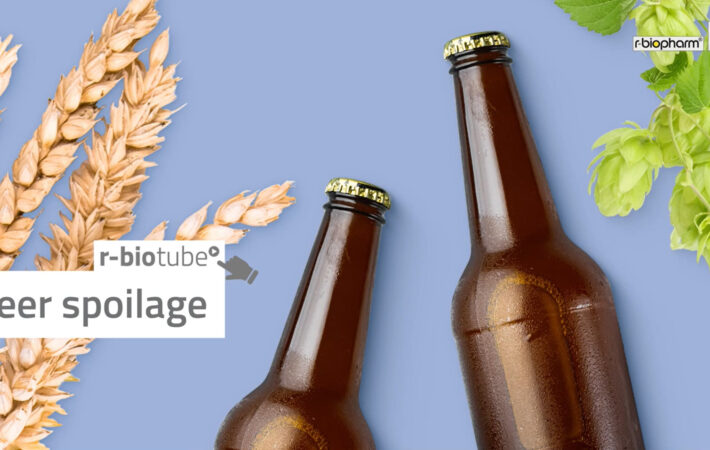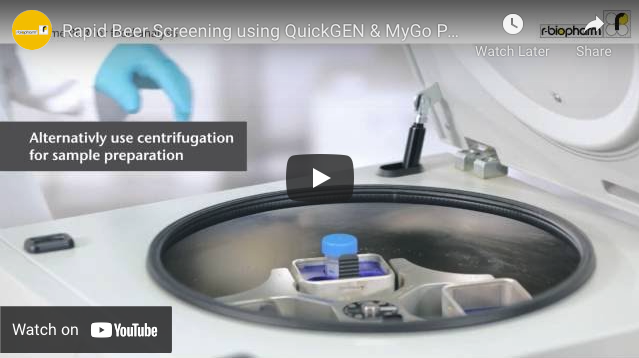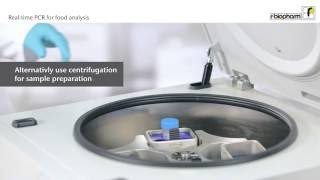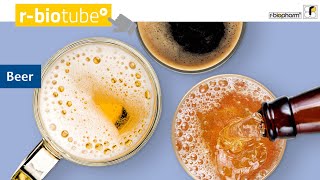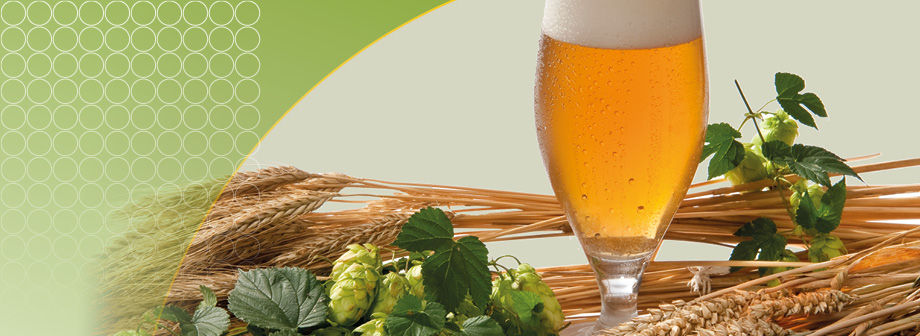
- Home
- /
- Industries
- /
- Beer analysis
Beer analysis
Do you want to test beer for beverage spoilers? For fast and specific screening and detection of microbiological spoilage parameters in breweries, a wide product line of qPCR kits is offered.
Spoilage bacteria and yeasts can cause turbidity, change of taste and off-flavors in beers. To avoid losses or recalls, it is important to test for spoilage organisms in all areas of production. For fast and specific screening and detection of microbiological spoilage parameters in beer production, we offer a wide product line of test kits. The following spoilage bacteria and yeasts are of special interest in the beer industry and should be monitored:
Dekkera bruxellensis (anamorph Brettanomyces bruxellensis) is a spoilage yeast in beverages, especially important for the wine industry, where it has been shown to produce high amounts of volatile phenols (4-ethylphenol and 4-ethylguaiacol) imparting off-flavors to red wines. The yeasts of the species Dekkera bruxellensis are responsible for serious economic losses in the wine industry owing to their ability to spoil wines by the production of ethylphenols. Some authorities consider “brett” to be responsible for 90% of the spoilage problems in premium red wines. However, in the production of beer (especially craft beer or Belgian beer specialities), Dekkera bruxellensis is often not considered as contaminant, but as flavor enrichment.
Lactobacillus may be part of a regular fermentation process, but can also cause undesired acidification of beer or spoilage of fruit juices. Lactobacilli are killed by standard pasteurization.
Megasphaera are gram-negative, strictly anaerobic bacteria. They are well-known as beer spoilers producing off-flavors and turbidity.
Apart from Megaspaera, Pectinatus is another important spoilage bacterium in beer production. The gram-negative and strictly anaerobic bacterium causes turbidity and off-flavors reminiscent of rotten eggs.
Pediococcus is a genus of gram-positive lactic acid bacteria which are considered as contaminant in wine and beer. However, in some beer styles, the presence of Pediococcus may be desired.
Pichia is a genus of yeasts in the family Saccharomycetaceae. It is used in the fermentation process in winemaking, but it can spoil wine when present in high quantities. Pichia may also cause turbidity and off-flavors in beer.
Saccharomyces is a genus of fungi including various species of yeasts. One of the best known species is Saccharomyces cerevisiae which is used in the production of beer, wine or bread. The species Saccharomyces diastaticus is a spoilage yeast in the wine and beer industry.
Beer analysis with GEN-IAL® can help you to avoid product recalls, to minimize production losses and to prevent damage to brand image. We offer test systems for in-process control and/or for on-line final product control. Use different analytical modules to establish your customized monitoring of microbiological beer spoilage organisms in beer and beer products: Either extremely fast or maximal sensitive detection and specific identification is possible by combining different methods of sample preparation and detection with real-time PCR.
Our GEN-IAL® portfolio includes screening kits and beer-specific kits. The new GEN-IAL® QuickGEN line is characterized by a simple and rapid sampling and assay process, providing results within two hours after sampling. The test is based on filtration or centrifugation with subsequent qPCR and allows an extreme rapid and specific screening and detection in beer without pre-enrichment (reduced sensitivity, no differentiation in vitality). Analysis is very easy to perform even for untrained users.
The established qPCR kits based on pre-enrichment of the sample allow a sensitive screening and specific detection. The new concept of pre-coated 8-well qPCR strips (TPBD, TPYB) enables the user to screen and identify safely over 30 beer spoilage bacteria and yeasts in one qPCR run without misinterpretation and can be performed on common multiplex blockcyclers.
GEN-IAL® product overview
You can find more information on our real-time PCR test kits for beer analysis in our free brochure.
Test kits for beer analysis
| Product | Description | Tube | Art. No. |
|---|---|---|---|
| GEN-IAL® QuickGEN P1 Screening | Qualitative detection of bacterial and yeast contaminations | high | Q021 |
| low | Q022 | ||
| white | Q023 | ||
| MG | Q024 | ||
| – | Q025 | ||
| GEN-IAL® QuickGEN P1 Screening without yeast | Qualitative detection of bacterial contaminations | high | Q031 |
| low | Q032 | ||
| white | Q033 | ||
| – | Q035 | ||
| GEN-IAL® QuickGEN P1 and S. diastaticus Screening | Qualitative detection of bacterial and S.diastaticus contaminations in filtrated beer and beer mixes. | high | Q041 |
| low | Q042 | ||
| white | Q043 | ||
| MG | Q044 | ||
| – | Q045 | ||
| GEN-IAL® QuickGEN P1 Screening and Hop resistance | DNA screening and differentiation of beer spoiling bacteria and hop resistance genes | high | Q051 |
| low | Q052 | ||
| white | Q053 | ||
| MG | Q054 | ||
| GEN-IAL® QuickGEN P1 Screening and Hop resistance | DNA screening and differentiation of beer spoiling bacteria and hop resistance genes | – | Q055 |
| GEN-IAL® QuickGEN Beer yeast and bacteria differentiation | Multiplex detection and identification of beverage spoiling bacteria and yeasts | high | Q071 |
| low | Q072 | ||
| white | Q073 | ||
| GEN-IAL® QuickGEN Beer Differentiation PCR Kit | Multiplex detection (30 species) and identification (19 species) of relevant beer spoilers (bacteria and yeasts) | high | Q081 |
| low | Q082 | ||
| white | Q083 | ||
| GEN-IAL® QuickGEN Biofilm | Specific DNA detection of Lactococcus lactis, Leuconostoc mesenteroides and Pichia anomala | – | Q095 |
| Product | Description | Art. No. |
|---|---|---|
| GEN-IAL® QuickGEN Hop resistance | Specific DNA detection of hop resistance genes | Q105 |
| GEN-IAL® QuickGEN Pectinatus/Megasphaera differentiation low | Specific detection and differentiation of Pectinatus and Megasphaera | Q112 |
| GEN-IAL® QuickGEN Enterobacteriaceae spp. | Multiplex PCR-detection of enterobacteriaceae as indicators for hygiene and postprocessing contaminations | Q145 |
Please note: The last digit of the article number identifies the tube version (1=high, 2=low, 3=white, 4=MyGo Pro, 5=liquid reagents without precoated strips). For example, the article number Q331means high tubes, Q332 means low tubes, Q333 means white tubes and Q334 means low MyGo Pro tubes.
DNA preparation:
| Product | Description | Art. No. |
|---|---|---|
| GEN-IAL® QuickGEN Sample Preparation Centrifugation | DNA preparation of beverage samples, Centrifugation | Q002 |
| GEN-IAL® QuickGEN Sample Preparation Filtration | DNA preparation of beverage samples, Filtration | Q004 |
| GEN-IAL® QuickGEN Yeast Sample Preparation Centrifugation | Microbial DNA-Extraction from samples with high yeast cell counts e.g. yeast tanks, propagation etc. | Q005 |
What is the right test kit for you?
Our “decision tree” helps you to find the real-time PCR kit that best suits your needs in beer analysis.
Product portfolio
| Product | Description | No. of tests/amount | Art. No. |
|---|---|---|---|
| QuickGEN PCR Kit Yeast universal |
Qualitative detection of yeast contaminations in beverages. For exapmple: Saccharomyces spp. Dekkera spp. Zygosaccharomyces spp. Rhodotorula spp. Torulaspora spp. Kluyveromyces spp. Debaromyces spp. Candida spp. Hanseniaspora spp. Pichia spp Read more |
48 reactions: 48 x Dye Strips (freeze-dried, incl. IC-DNA) | Q982 |
| GEN-IAL® QuickGEN P1 and Dekkera spp. Screening |
Qualitative detection of bacterial (Lactobacillus/ Pediococcus / Megasphaera/ Pectinatus) and Dekkera spp. contaminations in filtrated beer, beer mixes and yeast containing samples: Read more |
48 reactions | Q091, Q092, Q093, Q094 |

